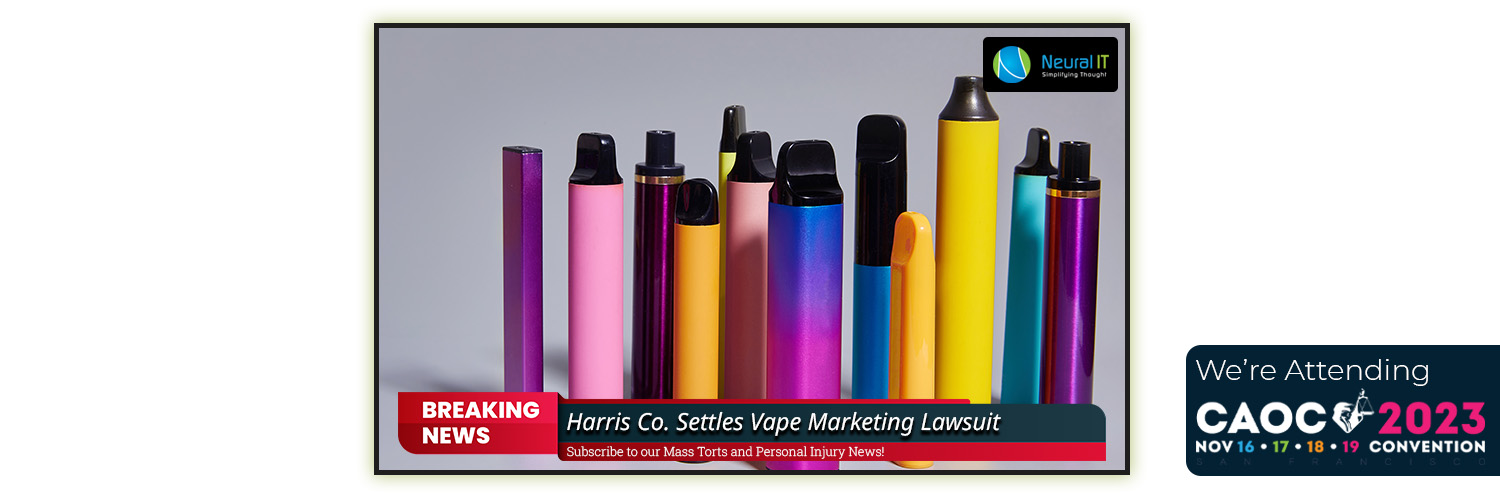Harris Co. Settles Vape Marketing Lawsuit

The Harris County Attorney has announced a settlement in the county's lawsuit against Altria Group, Inc., Philip Morris USA, Inc., and related companies regarding their deceptive marketing of Juul e-cigarette products to minors.
Harris County Attorney Christian emphasized the significance of this victory for Harris County residents and the government. The lawsuit aims to hold e-cigarette companies accountable for promoting Juul products to young people, leading to a nationwide problem of youth addiction to vaping.
Juul is an electronic nicotine delivery system that heats a nicotine solution to produce an aerosol for users. The county's lawsuit alleged that Altria, as a part owner of Juul, played a role in expanding the company's youth-friendly nicotine flavors to a wider customer base.
Harris County made history in 2021 by being the first governmental entity in Texas to file a lawsuit against Juul, Altria, and related entities in response to the youth vaping epidemic. In February, Harris County resolved its claims against Juul as part of a global settlement.
The funds obtained from the settlement with Altria and other entities will be deposited into Harris County's general fund, and the distribution of these funds will be determined by the Commissioners Court.
In a separate case, the Florida Attorney General initiated a lawsuit against Juul Labs, accusing the company of marketing its products to children inappropriately and providing misleading information about the nicotine content in its offerings.
The lawsuit against Juul alleges that the company engaged in extensive marketing campaigns aimed at underage users. These efforts included hosting launch parties, using youthful models in advertisements, active social media presence, and distributing free product samples. Juul also designed its products with a modern, tech-savvy appearance that could be easily hidden and offered flavors known to be attractive to underage consumers.
In response, Juul stated that the attorney general chose not to participate in a settlement the company reached with 48 states and territories. Juul highlighted the steps it has taken, such as discontinuing the distribution of non-tobacco and non-menthol products in anticipation of FDA guidance on flavors, ending mass-market product advertising, and reorganizing the company to focus on combating underage use. Juul claimed that these efforts resulted in a 95% reduction in underage usage of its products.
Merck Shingles Vaccine Appeal To Test Mass Torts Tool

In March 2022, the federal trial judge presiding over a four-year-old multidistrict litigation related to Merck's Zostavax shingles vaccine made a crucial decision.
Having already granted summary judgment to Merck in five bellwether cases where plaintiffs alleged that the vaccine caused shingles instead of preventing it, the judge found that the plaintiffs' expert had not provided scientifically reliable evidence linking their illness to Merck's vaccine. The judge determined that the only reliable method to establish this link was through a laboratory test called a polymerase chain reaction (PCR) assay. Government researchers had used PCR tests to investigate the potential connection between the Merck vaccine and shingles, a point that Merck did not contest, although they maintained that such cases were extremely rare.
Taking this lesson from the bellwether litigation, the judge issued a Lone Pine order, an increasingly common case management tool in multidistrict litigation. This order required nearly 1,200 plaintiffs in the consolidated case to submit laboratory test results demonstrating a specific link between the shingles virus they contracted and the strain contained in the Merck vaccine.
Plaintiffs' lawyers argued that the evidence the judge demanded simply did not exist and could not be produced. They pointed out that tests to identify the virus strain causing shingles were not a standard part of treatment when plaintiffs were diagnosed, and these tests were not performed during their illness. Moreover, because PCR tests must be conducted while the virus is active, there was no way for plaintiffs to obtain such lab results years after their shingles episode.
However, despite these protests, in December 2022, the judge dismissed the cases of nearly 1,200 plaintiffs, stating that none of them had provided "laboratory reports or other relevant documentation" meeting the requirements of the Lone Pine order.
The judge acknowledged that plaintiffs insisted they could establish specific causation without PCR tests. Still, he argued that they had not presented any of their supposed evidence for causation and had not addressed the "indisputable evidence" that PCR results were the only reliable proof in this regard.
